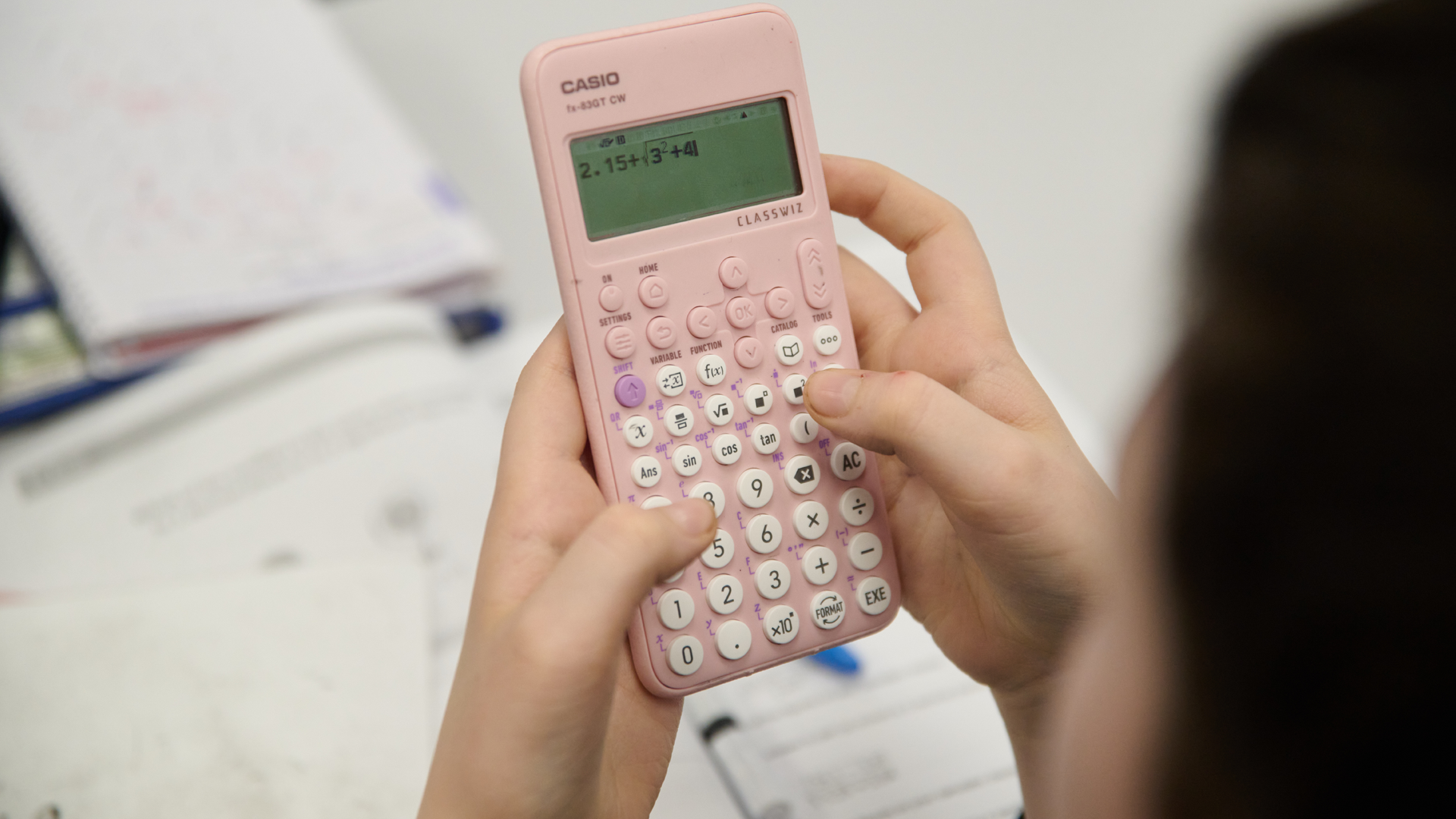What is Maths?
Mathematics is the study of patterns, structures, and relationships using numbers, shapes, and logical reasoning. It helps us make sense of the world by providing tools to understand and describe quantity, change, space, and data. At its core, maths is about problem-solving, logical thinking, and developing a deep understanding of how different concepts connect.
Why is Maths Important?
Mathematics is essential not just in school but in everyday life. From managing money and time to interpreting data and making decisions, maths plays a central role in helping us navigate the modern world. It underpins many aspects of daily life, as well as countless careers in science, technology, engineering, business, and beyond.
In education, maths builds skills that are transferable across subjects and into life after school—such as reasoning, precision, and resilience. Success in maths unlocks opportunities and opens doors, particularly at GCSE level, where a strong grade in mathematics is a gateway to many post-16 options and further education pathways.
The Importance of Maths at KS3 and GCSE
At Key Stage 3 (KS3), students build a solid foundation in number, algebra, ratio, geometry, statistics, and probability. This stage focuses on developing fluency, mathematical reasoning, and problem-solving skills to prepare students for the more complex concepts encountered at GCSE.
At GCSE, students refine their understanding and application of mathematics. They explore more advanced topics and are expected to make connections between different areas of maths. The curriculum aims to ensure students are confident and competent, able to apply their knowledge to both familiar and unfamiliar problems.
Both KS3 and GCSE are not just about content knowledge, but about developing a mathematical mindset—where students are encouraged to think logically, persevere, and approach problems with confidence.

Why We Teach Maths for Mastery
At our school, we follow a Mastery approach to mathematics, in line with guidance from the NCETM and the National Curriculum. Teaching for mastery means all students are given the opportunity to develop a deep, secure, and adaptable understanding of mathematics.
Key principles of the mastery approach include:
- Fluency: Developing quick and accurate recall of facts and procedures, alongside flexibility in applying them.
- Representation and Structure: Using visual and concrete models to expose mathematical structures and help students understand the 'why', not just the 'how'.
- Mathematical Thinking: Encouraging logical reasoning, pattern spotting, and problem-solving as central to every lesson.
- Coherence: Small, connected steps that build knowledge systematically, ensuring nothing is learned in isolation.
- Variation: Carefully designed tasks that highlight key concepts and challenge students to think in depth.
Mastery is not about moving through content quickly, but about ensuring every student fully understands before moving on. This inclusive and ambitious approach allows all students to achieve mathematical success.
How We Learn Maths at Cardinal Wiseman
At our school, we believe every pupil can succeed in maths. That’s why we follow a knowledge-rich curriculum where mathematical ideas are broken down into clear, manageable steps. This approach helps everyone build deep understanding, confidence, and fluency over time.
Each topic in maths is divided into small sections in our Knowledge Books. These books guide our learning and help us to keep track of key facts, methods, and strategies. We revisit and practise these ideas often, so knowledge is not just learned—it’s remembered and used.
At the end of each section, pupils work on Deepening Understanding, which focuses on three key areas:
- Intelligent Practice – carefully chosen questions that help us spot patterns, make connections, and think hard about the maths we're learning.
- Method Selection – learning to choose the most efficient and accurate method for the task, not just following steps without thinking.
- Purposeful Practice – practising skills in meaningful ways, so we understand not just how to do something, but why it works.
We also place a strong emphasis on talking about maths. Pupils are regularly encouraged to explain their thinking, ask questions, and work with others to solve problems. This develops reasoning skills and helps pupils become confident, articulate mathematicians who can justify their methods and challenge ideas respectfully.
Why This Helps Pupils
- Small steps build big understanding: Learning maths in small, logical steps helps everyone feel secure and successful.
- Deep learning lasts: Revisiting and practising knowledge in different ways helps pupils remember and apply it, not just for tests—but for life.
- Talking deepens thinking: When pupils explain their ideas to each other, they develop a better grasp of the concepts themselves.
- Problem solving builds confidence: Pupils learn not to fear mistakes but to see them as part of the learning journey. This mindset helps them tackle unfamiliar challenges with resilience.
- Mastery, not memorisation: Pupils don’t just ‘get through’ the curriculum—they master it. This means they are ready for the next stage of their learning and can apply their knowledge flexibly and creatively.
This approach reflects our belief that maths is for everyone, and that with the right support and challenge, every pupil can thrive.
Extra-Curricular Maths Opportunities
At our school, we believe maths doesn’t stop at the classroom door. We offer a range of extra-curricular opportunities for pupils to explore mathematics beyond the curriculum, challenge themselves, and enjoy the subject in new and exciting ways.
Some of the events and competitions we take part in include:
- UKMT Maths Challenges (Junior and Intermediate): National problem-solving competitions that encourage creative thinking and logical reasoning.
- Maths Feasts (run by AMSP – Advanced Mathematics Support Programme): Team-based events designed to stretch and engage pupils through rich mathematical challenges.
- Local Maths Competitions: We take part in friendly competitions with other local schools, giving pupils the chance to collaborate, compete and showcase their skills.
- Some pupils also opt to study Further Maths in Transformation and some go onto achieve an additional qualification in year 11 in this.
Why This is Great for Pupils
Taking part in maths activities outside the classroom helps pupils to:
- Stretch their thinking – These challenges often involve unfamiliar and non-routine problems that develop reasoning and resilience.
- Work as a team – Many events are team-based, helping pupils improve communication and collaboration skills while enjoying shared success.
- Grow in confidence – Competing in a wider arena gives pupils pride in their abilities and helps them see themselves as capable mathematicians.
- Develop a love for maths – These opportunities show that maths can be exciting, creative, and full of surprises—not just something done in exercise books.
- Prepare for the future – Problem-solving, logical thinking, and teamwork are all skills that are highly valued in further education and the workplace.
Whether pupils are competing, collaborating, or just taking part for fun, our extra-curricular maths activities help them become curious, confident and capable mathematicians.
Sparx Maths: Daily Practice for Long-Term Success
At our school, all pupils use Sparx Maths for 30 minutes at the start of each day as part of our commitment to building strong mathematical foundations and supporting long-term progress.
What is Sparx Maths?
Sparx Maths is an intelligent online platform that provides personalised, high-quality maths practice. Every question is carefully matched to each pupil’s ability and learning journey. The system adapts in real time, ensuring pupils are always working at the right level and revisiting key content to keep it fresh.
Why Sparx Maths is Helpful
- Personalised learning: Every pupil receives a tailored set of questions that are right for them—whether they need more practice, extra challenge, or targeted revision.
- Builds strong habits: Daily practice helps pupils retain knowledge over time. Short, regular sessions are proven to improve memory and understanding far more effectively than last-minute revision.
- Supports independence: Pupils learn to take ownership of their progress, using worked examples and support videos to help them when they get stuck.
- Encourages resilience: Sparx is designed to make pupils think carefully and persist through challenging tasks, building confidence and problem-solving skills.
- Links directly to classroom learning: The practice pupils do on Sparx reinforces what they’ve learned in class and prepares them for future topics.
By using Sparx Maths daily, pupils are not only building fluency and accuracy, but also developing the confidence, habits and independence that will support them throughout school and beyond.
How Parents Can Support Sparx Maths at Home
At our school, we know that when schools and families work together, pupils make even greater progress. You can support your child’s learning on Sparx Maths in simple but powerful ways—no need to be a maths expert!
✅ Encourage a regular routine
Even though pupils complete 30 minutes each day in school, Sparx also sets other tests called XP boost and Target tailored to your child’s needs. Help them build the habit of completing it on time, in a quiet space, without distractions.
✅ Show interest
Ask your child what they’ve been working on in Sparx. Encourage them to explain a question they found tricky or something new they’ve learned. Talking through maths helps build confidence and deepens understanding.
✅ Praise effort, not just scores
Sparx is designed to challenge pupils—getting a question wrong isn’t failure, it’s part of learning. Celebrate persistence, careful thinking and improvement over time.
✅ Use Sparx's support tools
If your child is stuck, Sparx offers worked examples and video tutorials to guide them through the method. Encourage them to make use of these instead of guessing or giving up.
✅ Check in with progress
You can ask to see your child’s Sparx progress or speak to their teacher if you have questions. Sparx also sends updates and certificates when pupils hit milestones—these are great to celebrate at home!

Working Together for Success
By supporting your child’s use of Sparx Maths at home, you’re helping them build lifelong learning habits. With your encouragement and our daily practice in school, your child will gain the skills and confidence they need to succeed—not just in maths, but in any challenge they take on.
GCSE Statistics (Edexcel)
An Optional GCSE for Curious, Critical Thinkers
At our school, pupils have the opportunity to study GCSE Statistics as an additional qualification alongside GCSE Maths. This is an exciting and valuable option for those who enjoy working with data, thinking critically, and applying maths in real-world contexts.
What is GCSE Statistics?
GCSE Statistics is all about understanding and interpreting data. It teaches pupils how to collect, represent, analyse, and draw conclusions from data in a logical and meaningful way. Pupils explore topics such as:
- Types of data and data collection methods
- Representing data using charts and graphs
- Averages, measures of spread, and interpreting distributions
- Probability and risk
- Drawing conclusions from data and evaluating reliability
- Real-world statistical applications (e.g. in health, business, the environment, and media)
We follow the Edexcel GCSE Statistics specification, which offers a well-structured and accessible approach to modern statistics.
How is it Similar to GCSE Maths?
- Both involve number work, data handling, and probability.
- Many of the skills in statistics complement and strengthen those used in the maths GCSE, such as interpreting graphs, using formulas, and problem-solving.
- Pupils use calculators, algebraic reasoning, and written explanations in both subjects.
How is it Different?
- Statistics focuses more deeply on data analysis and interpretation, rather than calculation or algebra.
- It requires pupils to think critically about how data is presented and used, including recognising bias, reliability, and misleading information.
- Real-world application is at the heart of statistics—pupils learn how data drives decision-making in society, science, and the media.
Why Do Pupils Choose GCSE Statistics?
Pupils are often drawn to GCSE Statistics because:
- They enjoy working with data, patterns, and real-life contexts.
- It supports other GCSE subjects like Geography, Science, Business, Psychology, and Sociology—all of which involve statistical thinking.
- It helps build confidence for GCSE Maths, reinforcing key skills in a different way.
- It develops skills valued in higher education and future careers, including analytical thinking, data literacy, and clear communication.
Who is it For?
GCSE Statistics is a great option for pupils who:
- Have an interest in how numbers and data explain the world
- Are considering future study or careers in STEM, economics, social sciences, business or research
- Want to gain a second GCSE in a maths-related subject
This qualification is widely respected and gives pupils a real advantage in a data-driven world.

